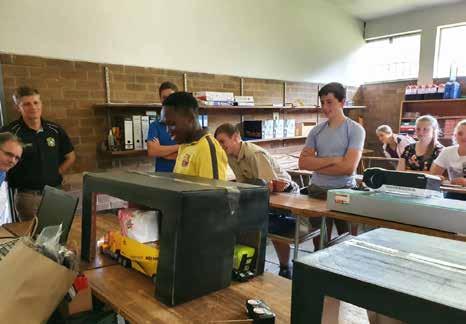
33 minute read
Agriculturists’ unique stewardship responsibility
As a concept, stewardship has strong spiritual roots. However, one does not have to be religious to embrace the principle that we have to keep the planet and its resources safe on behalf of future generations. We are not the owners of all around us; we are simply the cultivators, managers and guardians.
In the context of agriculture, stewardship is an extremely practical matter relevant to every person, given that the actions of growers and agri-roleplayers have a direct impact on the environment and natural resources – and that determines whether or not we have food on our tables.
Advertisement
The requirement and responsibility to not destroy what we have, consist of three facets as far as agriculture is concerned: 1. The fast-growing global population demands the production of more food. The problem is that we do not really have any more uncultivated arable land. On the contrary, urbanisation and development increasingly encroach on existing farms. The result is that more must be done with less. 2. The scarcity of natural resources, soil and water in particular, requires responsible and sustainable production. We cannot afford to destroy soil fertility or to pollute or exhaust water sources in the name of production. In the short-term this causes, among others, food safety issues; in the longer term, food security is at stake. 3. To address both these challenges, growers rely heavily on crop protection products and technology. Product stewardship is therefore also on agriculture’s agenda: the products and technology at our disposal must be protected so that they can remain usable to help realise optimal yields. The strict regulatory environment has led to an astronomical increase in the costs involved in researching and developing new crop protection molecules. The agriindustry is therefore under tremendous pressure to safeguard and even extend the lifespans of existing products by handling and using them responsibly and according to the guidelines. In so doing we not only address the continued effectiveness of the compounds, but we also limit to the absolute minimum any possible detrimental impact on the environment or the general wellbeing of humans and animals.
InteliGro’s stewardship philosophy is comprehensive, wide-ranging and integrated – and is at the heart of our business model.
We have always been convinced that there is more than one solution to every problem. Hence, we follow an integrated approach to pest and disease management, which is evident in crop solutions that combine chemical and biological options. Examples include the incorporation of biocontrol measures such as micro- and macroorganisms, plant extracts and mass-capture techniques. Biocontrol measures have no adverse impact on the environment and can be used by growers in the production of low- or noresidue produce, which means they are also safe for consumers.
In terms of product stewardship, we believe the answer lies in the empowerment of people. We therefore invest significant resources in the hosting of spray clinics where growers and their employees are trained in the safe handling and effective application of agricultural products.
Effective application drastically reduces the possibility of resistance developing in target pests and largely eliminates negative environmental impacts. It also positively influences the grower’s profitability, given the correlation between product handling and action, and the desired control outcomes.
Spray clinics furthermore focus on the safe handling of agricultural products in order to protect the health of farm employees, as well as the wellbeing of the environment and natural resources. The latter is addressed specifically through training on and practical support for the handling of product waste.
InteliGro’s stewardship approach includes the investment in accredited CropLife collection points at InteliGro depots. Growers and their staff are taught to rinse empty containers three times before handing them in at the collection points from where they can be recycled in a safe and responsible manner. This service not only solves a waste headache; it also facilitates market access for growers who have to comply with strict export regulations.
Stewardship’s focus on future generations is reflected in our InteliGro Kidz programme through which we invest in young people. In cooperation with agricultural high schools in particular, we aim to make a positive difference by exposing learners to opportunities in the broader agri industry, nurturing environmental awareness and encouraging stewardship.
While being highly rewarding, this interaction with the younger generation is also part of our investment in the future and sustainability of agriculture in South Africa, seeing that tomorrow’s growers hold our continued existence in their hands.
Businesses have a responsibility towards their shareholders, investors, employees and other stakeholders to implement their business strategy in a profitable way. The mandate of companies in the agricultural arena is to optimise yield – but never at the expense of people, the environment and animals.
Stewardship in agriculture is a shared responsibility with a role for growers, suppliers, consumers and every other stakeholder, and for it to be visible in our solutions, how we do things is just as important as what we do.
African Development Fund approves €63 million loan to boost food security
On 15 July 2022, the Board of Directors of the African Development Fund approved a loan of €62.99 million to Cameroon. The funding will enable the country to increase production of major agricultural crops (rice, maize, sorghum, millet, soybean, potato, palm oil and garden crops) in order to mitigate the impact of the food crisis caused by the war between Russia and Ukraine.
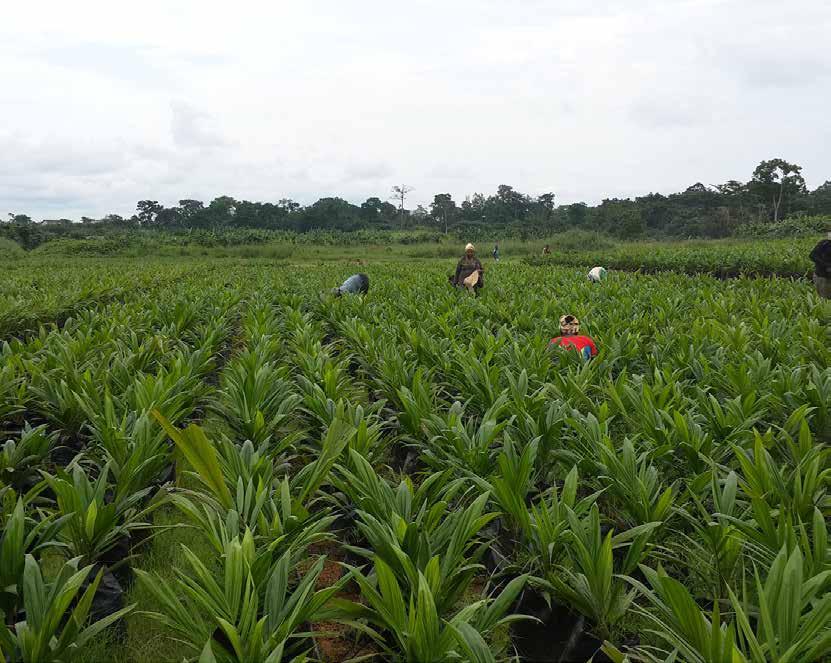
“This funding will allow the government to urgently procure the agricultural inputs needed for the current and future agricultural seasons and provide advice to farmers, while providing a boost to the reforms essential for improving governance of the agricultural sector,” explained Serge N’Guessan, the African Development Bank Group’s Director General for the Central Africa Region, based in Yaoundé.
The financing is provided by the African Development Fund, the concessional window of the African Development Bank Group. The main focus of the programme will be on making seeds available to producers. For example, 1,720 tonnes of seed rice, 2,500 tonnes of maize seed, 130 tonnes of sorghum seed, 2,400 tonnes of seed potatoes, 1.12 million pregerminated oilpalm seeds, 132 tonnes of soya seeds, 4 tonnes of garden crop seeds (tomato) and 67 tonnes of wheat seeds will be distributed.
Small farmers will also have access to agricultural inputs – nitrogen, phosphorus, and potassium fertilisers and urea – with subsidies representing 30% of the market price. Another strand of the programme, one of its most innovative, is the digitalisation of the distribution of agricultural inputs. The pilot phase is currently being rolled out in the coffee and cocoa sectors, but it will be extended to the foodstuff sectors.
The Bank’s investments will help Cameroon to produce an additional 221,449 tonnes of maize, 172,000 tonnes of rice, 9,750 tonnes of sorghum, 24,000 tonnes of potatoes, 45,000 tonnes of palm oil, 4,000 tonnes of soybeans, and 120,000 tonnes of garden crops (particularly tomatoes). The programme will also include the transfer to the municipalities of 1,550 agricultural outposts and 367 community action centres.
In this way, Cameroon will have emergency resources to finance both its current and next year’s agricultural campaigns. The main benefit of the programme will be to farmers, input importers and distributors, companies in the oilseeds and cereals sectors and the Cameroonian population as a whole.
On 20 May 2022, to address the effects of the war between Russia and Ukraine, which has led to soaring food prices, the African Development Bank Group authorised the establishment of a $1.5-billion African Emergency Food Production Facility (https://bit.ly/3vmxTAB). The Facility will provide agricultural seeds to 20 million African farmers. The main varieties concerned are wheat, maize, rice and soybean. The goal is to produce an additional 38 million tonnes of food, worth $12 billion, over the next two years.
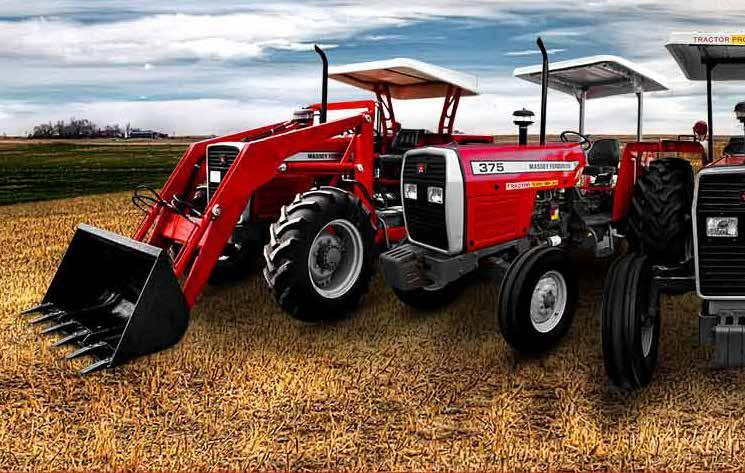
Yet another agri dealer switches to Massey Ferguson
Such has been the success of the Massey Ferguson brand in the Delmas, Mpumalanga region that AGCO Africa We have also found that the AGCO Africa team, comprising its product specialists, area manager and technicians, together provide an “We are privileged to have a dealer of the quality of M&F Bemarking onboard with us,” comments Dr. Dominik Reus, Managing Director, AGCO appointed M&F Bemarking as a dealer over a year ago. A family-owned business, M&F Bemarking was established more than 20 years ago as a specialist agricultural equipment and tool supplier. Derek Whitehorn, who has been in the area for 40 years, now works with son-in-law Morne van Heerden as General Manager. Morne says the switch from a rival dealership to the Frenchmanufactured Massey Ferguson Beauvais range has allowed M&F Bemarking to enter the high horsepower market segment, which is ideal for the Delmas region. “The parts availability is excellent, based as it is on a just-in-time basis. exceptionally high level of service.” In fact, Morne points out that AGCO Africa’s main warehouse hub for the continent is a mere 40 km away from Delmas, which means that M&F Bemarking can quite easily offer its customers a same-day service for any parts or spares it might carry in its own extensive stockholding. M&F Bemarking has four certified technicians with their own vehicles for any fieldwork, in addition to four over-the-counter salespeople at its main office to assist walk-in customers. Any additional repairs or maintenance is carried out at the dealer’s fully equipped workshop facility. Africa. “The farmers around here have been keen to have Massey Ferguson represented, so we embarked on an extensive search to find the right business partner that fits in with our vision and ethos, which is to put the farmer first.” Parts availability is therefore critical, with AGCO Africa putting in behind-the-scenes work to ensure it has sufficient spares stockholding whenever the demand arises. “While Covid-19 had a major impact on global supply chains, we have been proactive and forward-thinking to ensure our stockholding was not affected, which gives both our dealers and their customers peace of mind,” says Dominik.
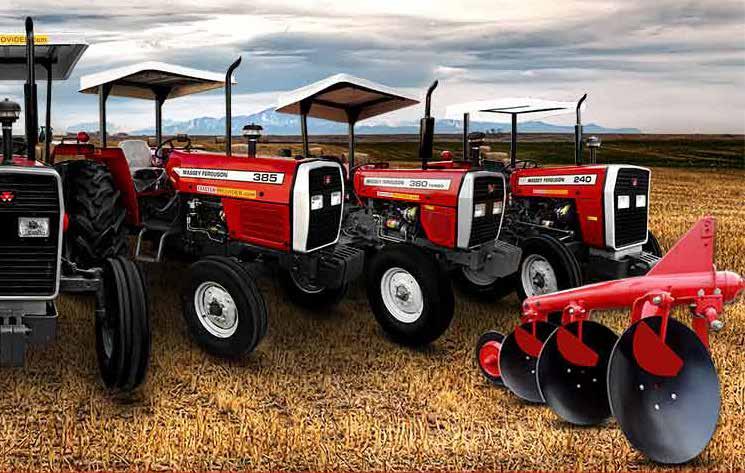
Jacques van Coller, who grew up in the Delmas area and currently farms with grains such as maize and soya, acquired his first tractor from M&F Bemarking in 2008. “About a month-andhalf ago, I contacted Morne to inform him we were on the lookout for a new tractor. He suggested we look particularly at precision farming, and we were impressed at the options he was able to offer us.”
Commenting on his two latest MF 7700 Series tractors, Jacques says that what stood out for him most is that all implements are simply plugand-play, which means the tractors are fully kitted out for his specific farming requirements from the get-go. “You buy tractors that are immediately ready for your needs, as well as the fact that they are user-friendly and simple to operate.”
Jacques also highlights that he does not have any other tractor on his farm that can match Massey Ferguson in terms of fuel efficiency and the lowest total cost of ownership. In addition, the lead time for his new equipment from Beauvais in France was quite short, meaning he took ownership of his new machines far quicker than anticipated. Martin Krog, who farms in the Delmas area with lucerne and oats on an alternating five-year cycle, has known Morne and his father-in-law for years.
“We were on the lookout for a tractor specifically with a cutter option, due to the type of farming we are engaged in. We discussed our options with Morne, who suggested the MF 8700 Series, as it has sufficient power for this application, even with the baler installed with its cutting blades. The dealer visited us personally at our office on the farm, and we sat and designed our tractor there and then using the AGCO ASK system.”
Dominik concludes that AGCO Africa’s strategy to become closer to the farmer has paid huge dividends in terms of dealers with the reputation and integrity of M&F Bemarking.
“The agricultural industry is tough enough as it is, without having to worry out about the robustness of your equipment or the ready availability of aftermarket support. Our partnership with M&F Bemarking is ample testament to the success of this approach, and we are guaranteed to walk a long path together in the years to come.” AGCO Africa is always on the lookout for new dealers in South Africa. We encourage potential dealerships to contact us to discuss their business plan.
This year Massey Ferguson, a worldwide brand of AGCO (NYSE:AGCO), is excited to announce a fresh look for its iconic Triple Triangle logo and its new ‘Born to Farm’ brand identity in celebration of its 175th anniversary. MF has offered farmers around the world straightforward and dependable machines since its inception. Few global brands can claim such a lasting impact in the agricultural industry.
In support of the farming community, Massey Ferguson has an extensive network of over 35 dealers covering the whole of South Africa, catering for parts, service, aftersales and new sales. Potential customers interested in the MF range can obtain all information from www. masseyferguson.co.za. Upon completing the contact form, potential customers will have the video, brochure and dealer contact details sent to their WhatsApp and email within 30 seconds.
BKT tires, resistant also against stubble
Hybrid crops, excessively short cutting and bad soil maintenance can cause punctures and tears. For this problem, which is increasingly felt by farmers, BKT suggests tires with specific compounds, in the ranges dedicated to harvesting and ploughing.
Would you walk like a fakir barefoot on a bed of nails? This is the image which can help visualize how a tire can suffer punctures and tears in crossing a field after the harvest, where the toughest stalks, the so-called stubble, can represent a real problem.
There are numerous causes, but only one solution: to use compounds and structural solutions to make the tire more resistant, because the stage immediately after the harvest, as well as dry-ploughing, are the conditions with the highest risk of puncture.
Producers of seeds, such as corn, soybeans, cotton and rapeseed, have developed genetically modified crops, which stay stable and have high wind resistance, can withstand significant temperature variations, resist disease and parasitic infections. But the counterpart to a robust crop is equally robust, extremely rigid stubble, in order to cut which operators have to fit out their machines with special equipment and above all with highly resistant, high-performance tires.
Stubble damages the tires in the areas of the sidewall and the tread, above all in the grooves. In passing over stubble the friction causes the detachment of large pieces of rubber, something which cannot always be repaired.
Of course there are techniques to reduce or prevent the problem: cutting stubble higher at the moment of the harvest, for example, thus allowing the tire to pass over the stubble in a point which does not penetrate, or using stubble deviation devices, such as stompers , which help push aside the residue before passing over it.
For the tires themselves too there are solutions and BKT has tried and introduced various ways to minimize the damage.
The most effective interventions regard specific, highly resistant compounds and structural changes in the body of the tire. An excellent solution is to use belts in aramid, a fiber which is five times more resistant than steel and characterized by high traction resistance. These belts also enable greater uniformity in the product on the ground, and at the same time guarantee better puncture resistance.
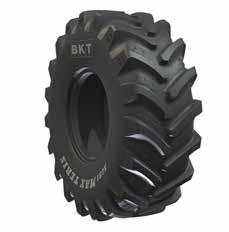
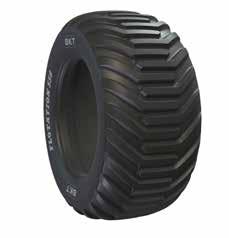
Given its sensitivity to this particular issue, for some years BKT has been working on its bias and radial tires, offering innovative aramidbelted versions , i.e. with belts in aramid for more resistance to punctures and special versions where the compound guarantees extraordinary resistance against cutting.
Against stubble, punctures and cuts, BKT thus deploys the exceptional characteristics of AGRIMAX TERIS, a radial tire which has a different compound from that designed for tractors, tougher and more resistant, for cropping and harvesting machines, in particular for combine harvesters.
A special protection for the sidewall and the reinforced shoulder increase the resistance and, consequently, also the life-cycle of this product. There is no lack of traction, stability and a high load capacity, key features of AGRIMAX TERIS which guarantee excellent performance. Numerous sizes available and some equipped with IF technology.
When instead it is time to plough and the machines are normally fitted with Flotation tires, for better distribution and weight support, in this case too BKT suggests specific products, FLOTATION 558 and FLOTATION 648, bias tires which already have Aramid Belted HD compound as standard to avoid punctures, and are especially suitable in the case of tough stubble.
FLOTATION 558 is a cross-ply tire for combine harvesters and round balers, both on and off the road.
FLOTATION 648 is particularly suitable instead for transport in the field, as well as spreading applications.
Both have a high traction capacity; the particular design of the tread allows the transport of very heavy loads at low pressure, consequently guaranteeing reduced soil compaction and at the same time protecting crops from damage. Specifically, the rounded profile, which is a feature of these tires and typical of bias products, is an excellent ally to deploy in the field.
Again from BKT and finally, there are the radial tires for agricultural equipment and trailers, which have already incorporated the use of different technologies to provide resistance to stubble. Among these, above all in the implement applications, we find:
AW 711, specifically designed for soil tillage applications, it has a special tread compound which ensures its long life-cycle, when used on both soft and hard surfaces; RIB 713, a tire whose steel belted structure guarantees extraordinary resistance to puncturing; SR 713, an All Steel radial tire with VF technology, characterized by a large tire footprint, for reduced soil compaction; and finally I-1, designed with a compound which is resistant to stubble to increase its duration and overall performance in the field.
Tecno Announces New Customer-Centric Strategy and Refreshed Brand Identity
SKF’s bearings, bushings, hub units, chains, belts, seals and lubrication systems are renowned for their premium quality, reliability and efficiency. It therefore comes as no surprise that these components are extremely popular with South Africa’s agricultural industry and are widely used by farmers on Combines, Planters, Tractors and various agricultural attachments.
“Our turnkey Agri-solutions, complemented by customer-specific solutions from our quality brands, SKF and PEER, add value to every stage of the crop cycle, from tillage, seeding and fertilizing/spraying to harvesting, mowing and baling,” states Charl Engelbrecht (Key Accounts Manager Agriculture). “The world-class quality and robustness of our products contribute to optimal and reliable machine and equipment performance, enabling farmers to sustainably maintain high production in less time to ultimately achieve profitable yields and successful business outcomes. Moreover, our products are specially designed to have a positive impact on the environment.”
Irrespective of the biome, the agricultural environment is unforgiving on machines and attachments. Added to this, farmers have limited seasonal windows in which to complete their crop cycles. Subsequently, field breakdowns are simply not an option as this can result in catastrophic production losses and exorbitant costs. To ensure dependable performance and prolonged life cycles, all SKF and PEER products undergo rigorous testing to make sure that they are able to withstand stringent field conditions such as heavy vibration, temperature extremes and ingress of contaminants such as water, mud, dust, fibres and plant material.
Agricultural customers are also under mounting pressure to increase yields to meet demand, while keeping input costs to an absolute minimum in order to remain profitable. They subsequently look to OEMs for equipment that delivers evergreater reliability, prolonged lifecycle, efficiency and performance.
“We work in close collaboration with the agricultural OEMs and their engineers to help develop and supply complete systems,” affirms Engelbrecht. “Ensuring that our products are fully compatible with OEM machines promotes high quality, cost-effective solutions that deliver low total cost of ownership and a rapid return on investment.” SKF’s wide range of bearings, including Explorer roller and ball bearings, insert bearings, plain bearings and bushings, are specially developed to handle aggressive agricultural conditions. The SKF Explorer range, recommended for tractors, offer multiple features that deliver more uptime for these essential agricultural workhorses. Offering optimised internal geometry for reduced friction, wear and heat generation, these tapered roller bearings accommodate higher load levels (up to 23% increased dynamic load ratings). These extremely robust bearings deliver extended service life, resist contamination and offer long service intervals.
“We supply bearings for the full range of agricultural attachments used for seeding including opener and closing discs as well as for gauge, press and implement wheels, seedmeter drive shafts and row markers,” continues Engelbrecht. “Our flanged insert bearing units are widely used on rolling baskets for independent tillage and gang discs.” He adds that one of the most commonly used gang disc bearing arrangements is the trunnion housing. The PEER Tillage Trunnion Unit (TTU) delivers countless benefits including increased productivity and bearing life.
SKF solutions for combine harvester applications, such as baling and mowing comprise a range of radial ball and roller bearings as well as agricultural insert bearing units that incorporate a relubrication-free design and a high performance sealing solution. “In addition to increased service life and reduced maintenance and ownership costs, our insert units, which are quick and easy to mount for enhanced uptime, keep grease from contaminating the yield,” notes Engelbrecht. Years of SKF R&D as well as rigorous testing in both the laboratory and in the field have shown that advanced sealing technology can significantly increase machine and equipment performance. SKF’s range of bearing seals delivers heavy-duty sealing performance on a great variety of agricultural attachments. “We have designed these application-specific agricultural products specifically to reduce the need for relubrication and simplify installation, saving valuable hours needed for field work,” explains Engelbrecht. “Furthermore, our seal designs eliminate the need for grease purge thus ensuring a positive impact on the environment. Our bearing seal types include Single lip, two to 7 lip, Cassette, double Cassette, SKF Mudblock and SKF Mudblock11 plus Cassette.”
SKF Agri Hubs have been specially engineered to boost farm productivity and profitability through increased performance and improved machine up-time while minimising the impact on the environment. These remarkable greased-forlife hub bearing units, which are widely used on disc ploughs, fertiliser injector discs, opener and closing seeding discs, etc., do not require relubrication. In addition to saving farmers valuable time and lubrication costs, these grease-free units prevent land contamination.
Engelbrecht explains that the SKF Agri Hub’s advanced hermetic sealing solution ensures that no lubricant loss will occur over the complete lifespan of this virtually maintenance free, plugand-play unit. The cutting-edge ‘mud block’ seal and special labyrinth, which is central to the sealing principle, achieves excellent sealing performance providing dynamic sealing against stone, mud and dust ingress. A special cup and O-ring system provides the static sealing of the disc side in the unit, making it impervious to contaminant ingress.
“As a valuable partner to the South African agriculture industry, we provide our agricultural customers with solid hands-on support through our professional and dedicated after-sales service solutions,” says Engelbrecht. “We invite NAMPO visitors to our stand (#121) in the NAMPO hall to come and explore our range of Agri solutions and obtain sound advice from our skilled technicians,” concludes Engelbrecht.
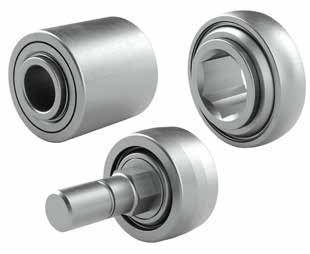
Latest CNH Industrial Investment reinforces the global leadership of CASE IH in crop protection
CNH Industrial acquires agricultural spray boom manufacturer Specialty Enterprises / Longer, lighter booms bring agronomic benefits / Solutions to be implemented across the Case IH range/
CNH Industrial has acquired Specialty Enterprises LLC (Specialty), North America’s largest manufacturer of premium aluminium spray booms for agricultural applications. Specialty, which operates one manufacturing facility in Wautoma, Wisconsin, has been a supplier to Case IH since 2020.
The direct ownership of spray boom production is the latest step in Case IH’s strategic road map for its sprayer product platform. As the company works to enhance its applicationproduct offering, the inclusion of longer, lighter booms enables accelerated development and deployment of new technologies. These solutions will be implemented across the Case IH product portfolio.
“We are thrilled to be working so closely with Specialty, which has been a fantastic partner to Case IH over the last few years, as we deliver more productive application solutions,” said Scott Harris, Case IH global president. “This acquisition strengthens our in-house capabilities and allows us to retain key strategic personnel to ensure continuity in this vertical integration.”
Helps maximize yield
The acquisition of Specialty signals Case IH’s continued commitment to Agronomic Design, helping operators maximise yield and ROI potential. As aluminium spray booms are up to 50% lighter than their steel counterparts, they result in less field compaction, less rutting and better weight distribution.

“At Case IH, one of our primary crop production goals is to help operators cover more acres more efficiently, with solutions that are built to last,” said Monte Weller, Case IH global product manager for Crop Production and Hay & Forage product lines. “This acquisition will be key to providing operators with the equipment and agronomic solutions they need to feed a growing world.”
Specialty is known for its advanced engineering and high-quality workmanship as a world-class welding operation. The company’s sprayer boom design incorporates multiple patents to virtually eliminate the fatigue cracking associated with other aluminium boom designs. The aluminium used by Specialty is sourced and extruded in the United States.
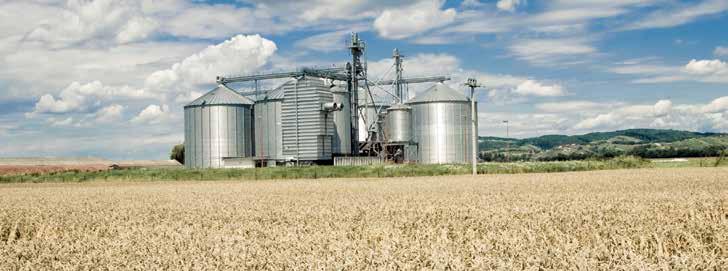
Genuine for over 50 years!

Grain Cooling GRANIFRIGOR™
The most natural way of grain preservation • Protection against insects & fungi • Without chemical treatment • Short amortisation period • Low energy demand • Independent of ambient weather • No respiratory losses
FrigorTec GmbH • info@frigortec.com • www.frigortec.com
Grain SA and ALFA collaborate for an expo like no other
After extensive discussions, Grain SA and ALFA decided in 2019 already to join hands and present a new agricultural expo, however, COVID-19 placed plans on hold for two years. Now, the two biggest role players in the industry will be hosting the very first NAMPO ALFA Livestock, Hunting and Outdoor Expo at NAMPO Park just outside Bothaville from 29 September to 1 October 2022.
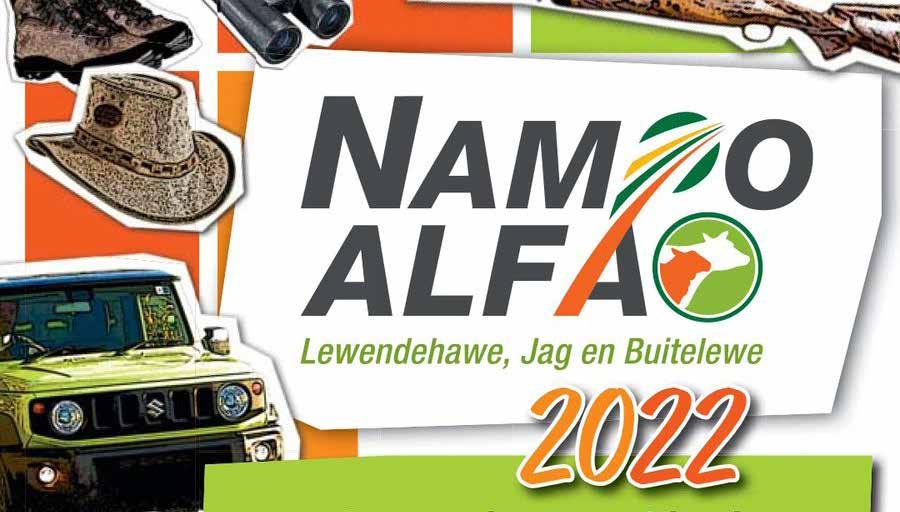
The livestock industry in South Africa is growing and forms an important part of the local economy. This growth was clearly visible in the fact that ALFA has grown over a four-year period into the best livestock expo in the country. The next logical step would be to make it even bigger, and with years of successful shows against its name, NAMPO Park is the ideal place where ALFA can spread its wings.
ALFA is not just an ordinary expo, and since its inception has offered several unique platforms that provide role players in the livestock industry excellent business networking opportunities. This applies to local role players and stakeholders across the African continent. For 2022, there is once again a packed livestock programme for young and old.
Simultaneously, there is currently a great need among producers for a hunting and outdoor expo with a practical approach. Livestock, outdoor life and hunting are extremely complimenting aspects of the South African agricultural community and the combination offers a winning recipe. NAMPO Park already has good systems and infrastructure including ample parking, kiosks, ablution facilities, livestock facilities and other venues that can not only accommodate this big event, but also facilitate opportunity for growth. In addition, NAMPO Park offers another great advantage - the South African producer already feels at home there.
A multitude of opportunities lies ahead that includes practical demonstrations of 4x4 vehicles, caravans, camping and hunting equipment. It even includes the possibility of a shooting range where those interested can experience and enjoy the practical experience of equipment. NAMPO Park is also host to the national SARRC rally during the expo where visitors can see famous racers in action. The livestock developments include a variety of projects that cover all the different livestock species, including, beef and dairy cattle, small stock, pigs and goats. It further include the National Beef Cattle Interracial Championships, the Junior Interracial (Agricultural Schools), the various performance championships (Large and Small Stock), and the Money maker qualifiers (Large and Small Stock). Furthermore, the youth programs with the agricultural schools and students are also involved and the programs and mini-expos with workhorses, working dogs, rabbits and poultry, are also back.
With a large variety of exhibitors, in the livestock, hunting and outdoor industries, the expo promises to be the one for livestock and nature lovers, hunters, adventurers and of course the adrenaline junkies.
WSAVA World Congress to Highlight Global Inequity in Access to Veterinary Medicines
By Libby Peacock
As WSAVA World Congress returns as a face-to-face event for 2022, its signature ‘Shaping the Future’ session is set to highlight the serious problems faced by veterinarians in Latin America and other regions of the world in gaining access to essential drugs needed to provide appropriate care for their patients. For example, many veterinarians struggle to access to opioid analgesics to treat pain, resulting in the unnecessary suffering of millions of companion animals.
The Shaping the Future session will be led by Professor Paulo Steagall, Co-chair of the WSAVA’s Therapeutics Guidelines Group (TGG). Both the causes and consequences of the difficulties veterinarians experience in accessing vital medicines will be explored by speakers from different parts of the world and TGG members during the session. They will also discuss potential solutions during a panel discussion.
In 2020, the TGG launched the first List of Essential Medicines for Cats and Dogs. Aimed at supporting the availability of drugs required to perform minimum standards of clinical practice, the peer-reviewed List includes both core and complementary essential medicines. During the Shaping the Future session, Professor Steagall will call for suggestions, comments and revisions of the current List from individuals and veterinary associations as part of an ‘open audit’ before it receives its three-year update. The TGG aims to publish the revised List in 2023.
Commenting, Professor Steagall said: “In addition to the welfare issues caused by the problems many colleagues experience in obtaining access to veterinary medicines, we should also consider the frustration this causes them as individuals as they are unable to provide the standard of veterinary care they have been trained to deliver. For a profession already under strain, this is just one more burden.
“We are delighted to be putting this issue in the global spotlight during this year’s WSAVA World Congress and hope that our discussions will help to create practical solutions, supporting pharmacovigilance and helping to mitigate the effects of a growing market for counterfeit pharmaceutical products. I would also like to say thank you to Zoetis, Platinum Partner of the WSAVA, for kindly supporting the session.”
“Ensuring veterinarians have access to innovative and approved medicines is one way we can

Anja Fourie owner of Timeless Tomatoes
continue to raise the standard of care for pets in all parts of the world, which will help them live longer, healthier, happier lives with their owners. Highly effective solutions exist for preventable illnesses and chronic conditions like osteoarthritis pain and dermatitis, but unfortunately, many of the smaller markets struggle to get regulatory approvals in a timely, efficient manner,” said Dr Mike McFarland, Chief Medical Officer at Zoetis. “We are committed to supporting practicing veterinarians around the world and providing them with the tools and new knowledge they need to deliver the best care options for the animals they treat. With these overlapping interests and respective missions to improve how veterinary medicine is practiced, Zoetis and WSAVA are building a strong partnership that can make a difference around the world.”
Taking place from October 29-31 October in Lima, Peru, WSAVA World Congress offers a packed scientific program in which global experts explore cutting-edge thinking and new trends in companion animal veterinary care. Speakers from Peru and wider Latin America are well-represented with lectures in both Spanish and English. Some of the English lectures will be translated simultaneously into Spanish to maximize their accessibility to delegates. Lectures by some of the WSAVA’s 2022 Award recipients are also included in the program.
WSAVA President Dr Siraya Chunekamrai said: “After three years apart we’re all looking forward to reuniting our dynamic global veterinary community in Lima later this year and hope that as many of our members as possible will be able to join us.
“WSAVA World Congress is, of course, an excellent congress – but it is so much more than that. It is an opportunity to learn, share experiences and socialize with colleagues from around the world – and this, in turn, creates the contacts and friendships that go on to enrich our delegates’ careers and lives. We are grateful to our member association AMVEPPA in Peru for all the hard work they are putting into making this yet another unforgettable congress and to our Industry Partners for their support. Lima – we’re on the way!”
To register for WSAVA World Congress 2022, visit https://wsava2022.com/register/. Early Bird rates are available until October 6.
US Microsoft’s Redmond campus inspires Zambia agritech startup

Chris Chileshe, founder of Aiponic/HRVST - Source Chileshe
Asmall idea born in the Microsoft Redmond campus in Seattle, Washington, the US, has grown to become a full-blown digital farm marketplace in Zambia.
Between September 2017 and August 2021, Chris Chileshe, a Zambian-American, worked as a software engineer at Microsoft in its Redmond campus, where he got exposed to sophisticated urban farming.
The Microsoft campus has approximately 50,000 employees, with over 100 buildings. Each building has its own café and aeroponic and hydroponic gardens growing fresh vegetables used in the campus’s kitchen and salad bars. Chileshe, as an employee, had the privilege of touring these gardens and investigating the technology involved in hydroponic farming. Automated cultivation machines called urban cultivators are used in the farm. The watering, light cycles, and ventilation system are all automated and can be controlled via a screen. The commercial-scale machines are said to be capable of producing 16 trays of microgreens (young seedlings of edible vegetables and herbs planted very close to home or the kitchen) at a time, and can go from seed to harvest in as little as eight days.
Growing produce inside can help reduce pest pressures, so the produce is grown without using any chemical pesticides or herbicides. The microgreens grown are 100% organic, nurtured with 100% organic compost, and grown with organic seeds. The tours would eventually inspire Chileshe to start Aiponics, an aquaponic and hydroponic farming startup based in Zambia.
“The team spent a year researching and learning about the various techniques involved in conditioning and maintaining an aquaponics ecosystem,” Chileshe told TechCabal in an email. He also said that since launching the company, Aiponics has successfully proven its own aquaponic prototype by developing a backgarden system that fits in a 40-foot shipping container.
But as impressive as this may sound, there was a problem: the production cost outweighed the reward. There was a need for business change. Should the company shut down operations, continue the line while booking losses, or pivot into something light on cost and heavy on revenue? The company went for the third option and built HRVST, a digital farm marketplace where people can order farm produce directly from the farmer.
“After building the container farm prototype and performing a cost analysis, the team decided to temporarily pivot from manufacturing containers due to how capital-intensive it would be,” said Chileshe.
“We focused on building the digital marketplace where the demand could be derived. This would allow Aiponics to establish the marketplace where the container farms would plug in to address supply shortages in certain regions.”
HRVST allows farmers to list their produce and sell directly to end-users and restaurants, making it easier and more affordable for buyers and sellers.
The platform has different functionalities tailored to support each end-user’s needs. For instance, on the vendors’ or farmers’ side, the app includes integrated point-of-sale features to facilitate cashless transactions using mobile money and credit card payments, performance analytics, order management, and fleet management.
On the side of the drivers who help in making fulfillment of orders, there are assigned orders, route optimisation, and delivery completion validation. Then the customers who are on the app to shop can order fresh food from an array of farmers to be delivered or picked up at designated
locations. They can schedule future orders and explore nutritional benefits of foods listed.
HRVST was launched into the market this month, and according to a company statement, the one -week old startup already boasts 79 restaurant partners across Lusaka, Zambia’s capital city, and hundreds of early-access users registered and already getting served by over 20 small- and large-scale farmers, who are a half of the Zambian population and, surprisingly, a decent backbone of Zambia’s economy.
The agricultural sector, though only contributing about 8.2% to Zambia’s GDP, accounts for employing almost half of the country’s population. And the government and various investors continue to throw their weights behind the sector. However, little has been done in using software to solve most of the sector’s problems. Hardware has been the centre of its technology.
For example, between April 7 and 9, the 7th edition of Zambia’s biggest agriculture technology event, Agritech Expo Zambia, organised by the Zambia National Farmers Union, took place. Due to its affiliation with the apex farmers association in Zambia, the event website said it promotes the interests of over 600 000 farmers across Zambia and pulls in over 15 000 stakeholders including farmers, agriculture small businesses and corporate companies, financial institutions, investors, and government officials.
While this event hosted the big names in the Zambian and African agriculture industry, agriculture software companies were scantily represented. Lima Link was one of the only notable product-led startups in the event and thus hinted at how almost non-existent or, better put, unrecognised this part of tech is in Zambia, one of Africa’s biggest agricultural nations.
HRVST will be joining a host of other small upstart building software to make agricultural prosperity easily accessible to farmers across the region. The platform is currently only available in Zambia but plans to extend into five new countries— Kenya, Tanzania, Angola, the Democratic Republic of Congo, and South Africa.
“With many parts of Africa facing a food crisis and the inherent risk of relying on other nations for food security, there has never been a better time to bring innovation and technology into a space that sorely needs it,” Chileshe said.
“We are focused on creating hyper-local capacity for food security while increasing the quality and diversity of the food available to every person on the continent.”
HRVST makes money by charging a subscription fee and a transaction fee to vendors.
“We feel this model allows us to have a shared success model with our vendors. We are highly incentivised to see them succeed and further incentivise our vendors by lowering the percentage transaction fee as their sales grow,” he said.
While the new ambition to scale HRVST across the region is overarching, the idea that was born out of Redmond hasn’t died. Chileshe said that “beyond the digital marketplace, Aiponics will soon continue to build a container-based aquaponic farm franchise model where the team would train local marketers and young farmers in aquaponics to create additional local capacity and empower more people to get out of poverty.”

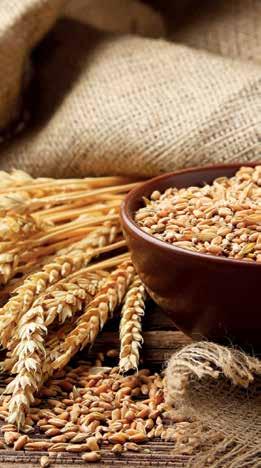
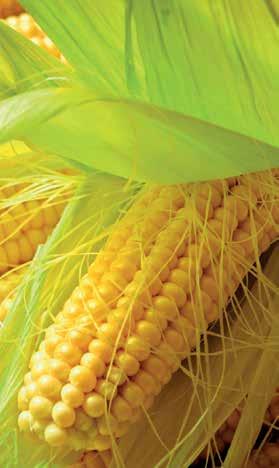
Fast, Precise Mycotoxin Results


Tel: +230 403 44 44 | info@afrosep.com | www.afrosep.com



